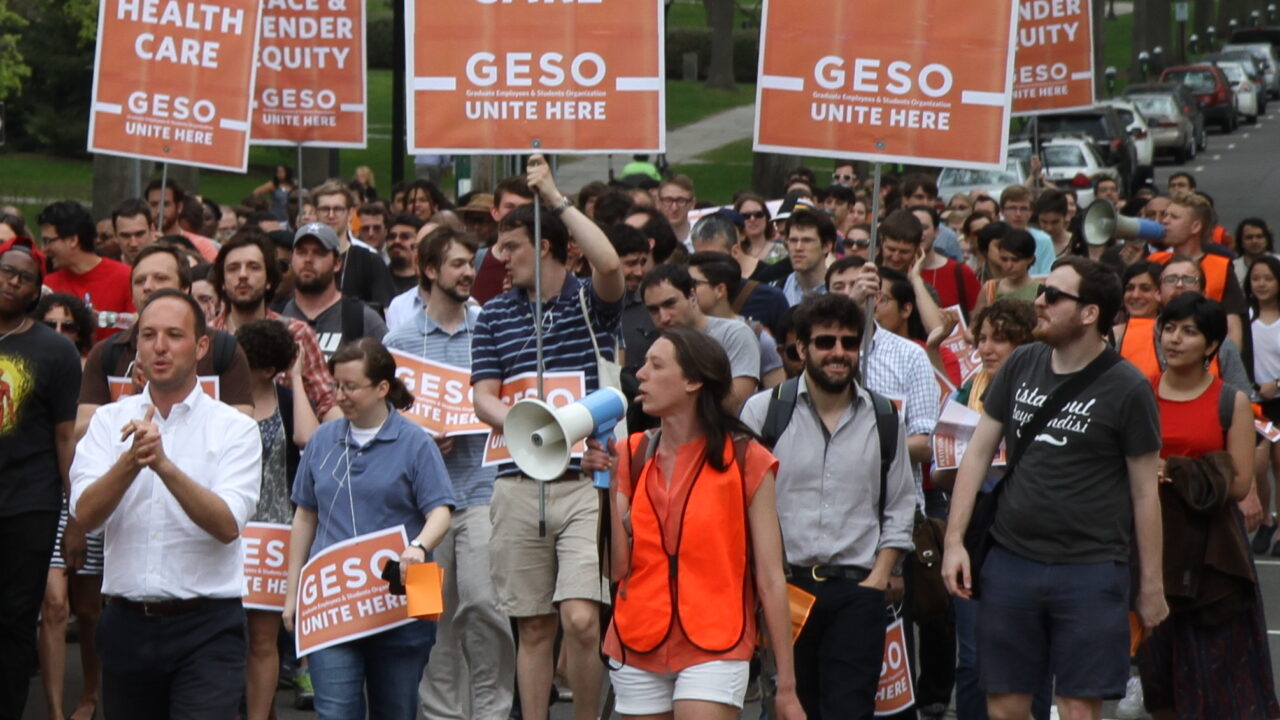When I was nine, my father and I left China to join my mother in Quebec, where she was completing a PhD in biology at a public university. We lived on a combination of my mom’s stipend, my dad’s part-time work in a pizza place, and various government subsidies. After graduating, my mom found a job in a laboratory only to be laid off a few months later because she was a “bad fit.” (I learned years later that “bad fit” was code for “not white enough.”) She began working as a waitress in a Chinese restaurant before deciding to leave her field for good and open a convenience store with my dad.
Given my mom’s journey, it had always made sense to me that grad workers were just like other workers — in need of the rights and protections that unionization offers. Teaching assistants at my mom’s university were unionized. When I started working toward a Ph.D. in mathematics at Yale, I threw myself into organizing my department.
Organizing was exhilarating, if challenging. In the union, I found a reprieve from my day-to-day struggles and a space where I felt safe talking about my fears and insecurities. My comrades and I commiserated over the pace at which we were expected to finish our work (our funding only covered five years when most dissertations took at least six to complete) and the abysmal job market that awaited us once we did. We vented about the inadequacies of our dental plan, which covered so little that international students waited months to return home for essential surgeries. We named professors in our departments who abused their students without a care for how famous those professors were. Most importantly, we dreamt of how each of us could thrive at an institution designed to take advantage of our labor.
The campaign that meant the most to me was around mental health care. Like many graduate students, I struggled with depression and anxiety. The toxic environment of academia, fostered by its relentless corporatization, takes its toll on the mind. A 2017 study concluded that roughly one-third of PhD students “are at risk of having or developing a common psychiatric disorder.” Whether it’s the precarious job market, an abusive advisor, or a low bank balance, graduate school can be both isolating and high pressure; it makes us miserable. As one of my comrades in the union once said, mental health is our occupational hazard.
The challenges of graduate school weighed especially heavy on me, an immigrant and person of color from a low-income background. My mentors told me I needed to work on my teaching because the stereotype among senior faculty in my field is that Chinese people can’t teach. My teaching would have to be outstanding if I were going to be considered for the same jobs as my peers. Unlike many of my peers, I didn’t have a safety net to fall back on if I didn’t get a job after grad school; I worried about how I would support my parents as they approached retirement. I kept most of my worries to myself, but it affected my mental health.
When I finally sought care, I found that the student health system was far from adequate. Appointments were not only hard to get; they were capped at twelve sessions per year. I began to organize around my struggles with mental health care on campus — and why I believed unionization was the way to address the mental health crisis in academia. The rap was simple but powerful. Over a decade ago, other workers on campus fought through their unions to win access to Magellan, an external mental health care network. With a union, we could win the same coverage for graduate workers.
Mental health care became a central issue in our union drive. Semester after semester, we submitted petitions, held rallies, and spoke out in the press. Each time, Yale either pretended to ignore our actions or cited budgetary constraints — in spite of an endowment in excess of $30 billion. Yet, as the pressure escalated, the university began to cede to our demands, hiring new therapists or announcing additional funding for the mental health department. A year after I finished my thesis, Yale announced that it was expanding Magellan to include all graduate students.
If my experience proves one thing, it’s that the mental health crisis among graduate workers is neither inevitable nor insurmountable. Winning adequate mental health care at Yale took innovative organizing, as well as a willingness to learn from the decades of experience other workers on campus have in fighting the university.
The corporate university thrives by pushing all of us down. We stand a chance by fighting together.

